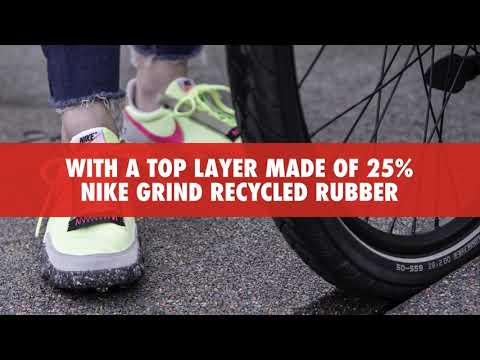
Lyft and Nike partner with the Portland Bureau of Transportation to deliver a bikeshare program in Portland, Oregon. BIKETOWN, now five years old, brings together both companies’ visions for human-powered transportation - Nike’s purpose to move the world forward through the power of sport by breaking barriers and building community and Lyft’s mission is to improve people’s lives with the world’s best transportation.
There’s another part of Nike and Lyft’s respective visions that the two companies share in common: a commitment to sustainability. With new e-stations, Lyft and Nike are building a circular economy -- where rather than a linear “take-and-make-waste” use of finite resources -- materials are used in a regenerative and sustainable way. That’s why Lyft has developed ebike and scooter docking e-stations featuring Nike Grind material.
E-stations are Lyft’s lightweight approach to docking stations that perform an important placemaking function in cities by giving riders a reliable place to park ebikes and scooters. They also move these modes off of sidewalks and bring order that benefits pedestrians. They are quicker and easier to install than classic stations, which will allow Lyft to extend its station-based approach in mid-sized cities and outside of the downtown core in larger ones. These new e-stations are also modular in design, allowing for different parking configurations and future upgrades. While one of Lyft’s major focuses was taking one step closer towards building cities around people, a similar commitment to sustainability provided the perfect opportunity to work with Nike Grind.

Since 1992, the Nike Grind program has recycled over 130 million pounds of both post-consumer and post-industrial waste into new products with partners across the world. The rubber mats of the Lyft e-station will be made with 25% Nike Grind rubber from Nike’s footwear manufacturing scraps in the top layer and 100% recycled tires in the bottom layer. The stations embrace the concept of circular economy by repurposing shoe scrap manufacturing waste and recycled tires.
The Nike Grind material creates a speckled finish on the e-stations that highlights material reuse and provides users with a softer, more approachable design to an often industrial space. The repurposed waste materials are given a new useful life in a long-lasting product, with Lyft e-stations having a planned 10-year lifespan. When the stations reach end of life, as with all Lyft hardware, these materials will be responsibly recycled.
Lyft and Nike consider the 40-station pilot that’s being rolled out in the coming months in Portland to be just the beginning. Further expansions are planned for the second half of 2021 in Denver and Chicago, giving an opportunity to transform Lyft’s entire new e-station footprint using this material.



Learn more about Nike Grind: https://www.nikegrind.com/
Learn more about Lyft sustainability efforts: https://www.lyft.com/blog/posts/esg-report-2020
Forward-Looking Statements Certain statements contained in this announcement are “forward-looking statements” within the meaning of the securities laws, including statements about Lyft’s business strategy and expansion plans for its e-stations. Such statements, which are not of historical fact, involve estimates, assumptions, judgments and uncertainties. There are a number of factors that could cause actual results or outcomes to differ materially from those addressed in the forward-looking statements. Such factors are detailed in Lyft’s filings with the Securities and Exchange Commission. We do not undertake an obligation to update our forward-looking statements to reflect future events, except as required by applicable law.